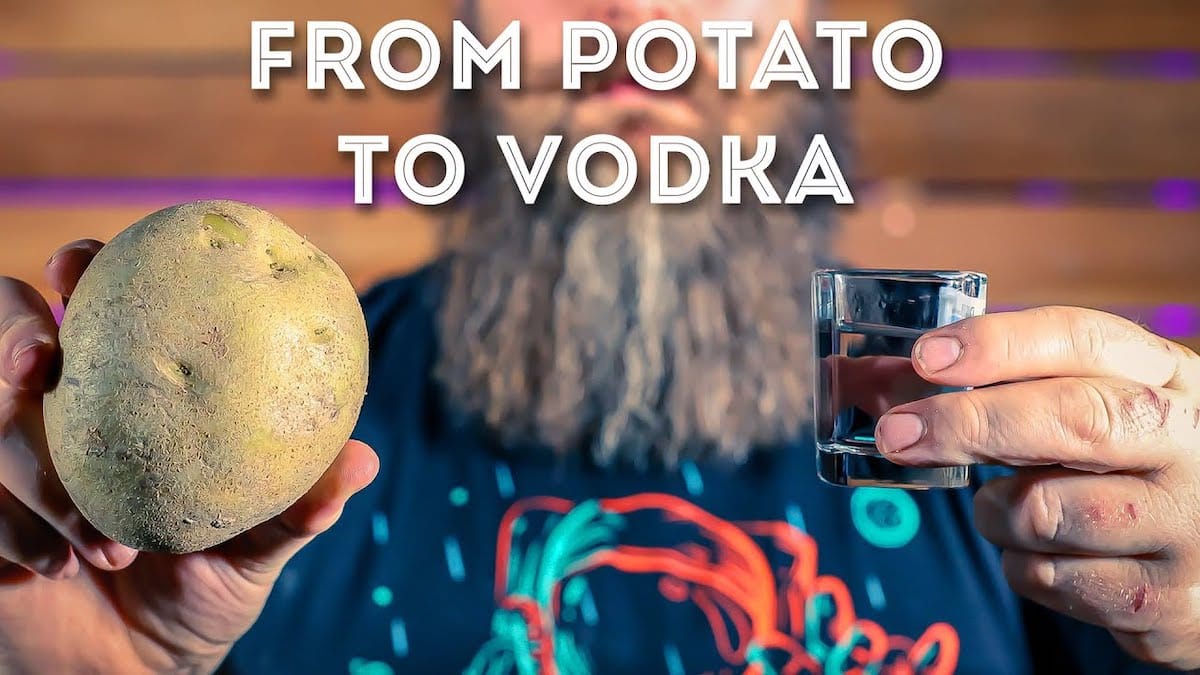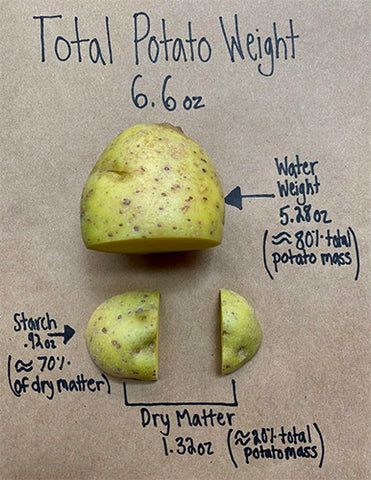Introduction To Vodka Production Methods

Vodka production methods vary based on the ingredients used and the desired characteristics of the final product. While potatoes have historically been associated with vodka production, this spirit can also be made from other raw materials such as grains or fruits. The key step in vodka production is the process of distillation, which involves heating a fermented mixture and collecting the alcohol vapor. This vapor is then cooled and condensed, resulting in a high-proof vodka. Various modern techniques and innovations have further enhanced the distillation process, allowing for the production of high-quality vodkas with unique flavors and profiles.
Methods Of Producing Vodka
There are several methods employed in the production of vodka. The most common method is distillation, where a fermented mixture is heated and the alcohol vapor is collected and condensed into a high-proof vodka. Another method is filtration, where the vodka is passed through activated charcoal or other materials to remove impurities and enhance its smoothness. Some producers also use multiple distillations or rectifications to further refine the vodka. Additionally, some modern techniques, such as continuous distillation or freeze distillation, are employed to create unique flavors and profiles in vodka.
Primary Ingredients Used In Vodka Production
The primary ingredients used in vodka production vary depending on the region and cultural traditions. While potatoes have historically been a popular choice, other ingredients such as grains, including wheat, rye, corn, and barley, are also commonly used. These grains provide a source of sugar or starch, which is essential for fermentation and the production of alcohol. Some vodka producers also use fruits, like grapes or apples, to create unique flavors and profiles. The choice of ingredients plays a crucial role in determining the taste, aroma, and quality of the final vodka product.
Historical Perspective On Vodka And Potatoes

The historical association between vodka and potatoes is deeply rooted in Eastern Europe, particularly Russia and Poland. While vodka has been produced in these regions for centuries, the use of potatoes in vodka distillation became prevalent during times when they were abundant and widely available. This association led to the misconception that all vodka is made from potatoes. However, it is important to note that high-quality vodkas are made from a variety of ingredients, including grains and fruits, and the choice of ingredient depends on the distiller’s preference and regional traditions.
Historical Use Of Potatoes In Vodka Production
Potatoes have played a significant role in the history of vodka production, particularly in Eastern Europe. In Russia and Poland, where vodka originated, potatoes were readily available and became a popular ingredient for distilling this beloved spirit. During times when grains were scarce, potatoes served as an abundant and cost-effective alternative. The use of potatoes in vodka production provided a unique flavor profile and a smoother texture to the final product. However, it’s important to note that while potatoes were historically used, modern vodka production has expanded to include a variety of ingredients.
Evolution Of Vodka Production Processes Using Potatoes
The evolution of vodka production processes using potatoes has been a fascinating journey. In the early days, potatoes were traditionally used to make vodka due to their abundance and affordability. However, as technology and distillation techniques advanced, other ingredients like grains became more popular. Today, while potatoes are still used in some vodka production, they are not the primary ingredient. Modern methods and technologies have allowed vodka producers to experiment with a wide range of ingredients, resulting in a diverse and innovative selection of vodkas available in the market.
Modern Vodka Production Techniques

Modern vodka production techniques have evolved significantly over the years. Distillers now utilize advanced methods to create vodka with precise flavors and characteristics. One common technique is multiple distillations, where the vodka is distilled multiple times to achieve purity. Another technique is filtration, which involves passing the vodka through activated charcoal or other filtering agents to remove impurities and create a smooth texture. Additionally, some distilleries employ modern equipment, such as column stills, to produce vodka in large quantities. These techniques ensure that vodka is produced efficiently and consistently, resulting in a wide range of high-quality vodkas available in the market today.
Modern Methods Of Producing Vodka
Modern vodka production techniques have evolved significantly over the years. Distillers now utilize advanced methods to create vodka with precise flavors and characteristics. One common technique is multiple distillations, where the vodka is distilled multiple times to achieve purity. Another technique is filtration, which involves passing the vodka through activated charcoal or other filtering agents to remove impurities and create a smooth texture. Additionally, some distilleries employ modern equipment, such as column stills, to produce vodka in large quantities. These techniques ensure that vodka is produced efficiently and consistently, resulting in a wide range of high-quality vodkas available in the market today.
Innovations In Vodka Production Without Potatoes
Innovations in vodka production have introduced alternative ingredients and methods that eliminate the necessity of using potatoes. One such innovation is the emergence of grain-based vodkas, which have become increasingly popular. The use of grains like wheat or rye has allowed distillers to create a variety of flavors and textures in their vodkas. Additionally, advancements in fermentation and distillation techniques have made it possible to produce vodka from other sources, such as fruits or even milk. These innovative approaches have expanded the possibilities for vodka production, demonstrating that potatoes are no longer the only option for creating this beloved spirit.
Clarifying Misconceptions: Is Vodka Made From Potatoes?

Clarifying Misconceptions: Is Vodka Made From Potatoes? The belief that vodka is exclusively made from potatoes is a common misconception. While it is true that potatoes were historically used in vodka production, modern distillation techniques have introduced a variety of ingredients. Grains such as wheat or rye are now the primary sources for vodka production. This innovation has allowed distillers to create diverse flavors and textures in their vodkas. While some vodkas still use potatoes, it is important to understand that potatoes are no longer the exclusive ingredient in vodka production.
Debunking The Myth Of All Vodka Being Made From Potatoes
Despite the common belief that all vodka is made from potatoes, this is actually a myth. While vodka can be made from potatoes, it can also be produced using various other ingredients such as grains (like wheat or rye), soybeans, grapes, rice, sugar beets, and even fruits or sugar. In fact, very little vodka is made exclusively from potatoes nowadays. Modern distillation methods have allowed for a diverse range of ingredients to be used, resulting in different flavors and textures in vodka production. So, it is important to debunk the misconception that all vodka is derived solely from potatoes.
Common Ingredients Used In Vodka Production
Common ingredients used in vodka production vary depending on the desired taste and quality. While potatoes were once a popular choice, today, grains like wheat, rye, barley, and corn are commonly used. These grains provide a neutral base, allowing for a smooth and clean flavor. Other ingredients like grapes, rice, sugar beets, soybeans, and even fruits or sugar can be used to add unique characteristics and enhance the aroma and taste of the vodka. The use of different ingredients contributes to the diversity and variety of vodka available in the market.
Popular Vodka Brands And Ingredients

When it comes to popular vodka brands, there is a wide variety to choose from. Each brand has its own unique ingredients and production methods that contribute to its distinct taste. Some well-known vodka brands include Absolut, Smirnoff, Grey Goose, and Belvedere. These brands use different ingredients like grains (wheat, rye, barley), corn, and even grapes. While some brands stick to traditional grain-based recipes, others experiment with unconventional ingredients to create a truly unique and flavorful vodka. It is this diversity in ingredients that caters to the varied preferences of vodka enthusiasts worldwide.
Analysis Of Popular Vodka Brands And Their Ingredients
Some of the most popular vodka brands in the market include Absolut, Smirnoff, Grey Goose, and Belvedere. Each brand has its own unique ingredients and production methods that contribute to its distinct taste. While Absolut is known for its use of winter wheat, Smirnoff uses a blend of corn and neutral grain spirits. Grey Goose, on the other hand, uses French wheat from the Picardie region, while Belvedere is made from Polish rye. These diverse ingredients allow each brand to offer a different flavor profile, catering to the varied preferences of vodka enthusiasts worldwide.
Comparison Of Potato-based And Non-potato-based Vodkas
When comparing potato-based and non-potato-based vodkas, there are a few notable differences to consider. Potato-based vodkas, like those made from potatoes or potato starch, tend to have a smooth and creamy texture with a slightly sweet flavor. On the other hand, non-potato-based vodkas, made from grains like wheat, rye, or corn, often have a lighter and cleaner taste. Additionally, the choice of base ingredient can impact the overall character and mouthfeel of the vodka. Ultimately, the preference between potato-based and non-potato-based vodkas depends on personal taste and desired flavor profile.
Conclusion

In conclusion, the production of vodka involves various methods and ingredients, and while potatoes have historically been used in its production, they are not the exclusive base ingredient. Vodka can be made from grains, such as wheat, rye, or corn, as well as other agricultural sources. The choice of base ingredient impacts the flavor profile and characteristics of the vodka. Therefore, it is essential to understand that not all vodka is made from potatoes. With the evolution of modern production techniques, vodka has become more diverse in its ingredients and flavors, catering to different preferences and tastes.
Summary Of Vodka Production Methods
The production of vodka involves various methods, including distillation and filtration, to create a clear, colorless spirit. While traditional vodka was made from grains and potatoes, modern production methods have expanded to include other agricultural sources such as corn, sugar cane, fruits, honey, and maple sap. The choice of base ingredient impacts the flavor profile and characteristics of the vodka. Vodka is typically produced through a process of fermentation and distillation, followed by filtration to remove impurities. This results in a high-proof alcohol that can be diluted to the desired alcohol content before bottling and distribution.
Final Thoughts On The Connection Between Vodka And Potatoes
In conclusion, while vodka can be made from potatoes, it is no longer the predominant ingredient used in modern vodka production. The misconception that all vodka is derived from potatoes has been debunked. Today, vodka is made from a variety of sources, including grains, corn, fruits, and other agricultural products. The choice of base ingredient greatly influences the flavor and characteristics of the vodka. So, the next time you enjoy a glass of vodka, remember that its origins are diverse and not limited to potatoes.
FAQ About Vodka Production Methods
Q: Is vodka always made from potatoes?
A: No, vodka can be made from a variety of raw materials including grains, fruits, and even sugar cane.
Q: What are the common raw materials used to make vodka?
A: Some common raw materials used to make vodka include wheat, rye, barley, corn, and potatoes.
Q: How is vodka typically produced?
A: Vodka is produced through a process of fermentation and distillation. The raw materials are fermented to produce alcohol, which is then distilled to purify and increase the alcohol content.
Q: What is the difference between potato vodka and grain vodka?
A: Potato vodka is made from potatoes, while grain vodka is made from grains like wheat or rye. The choice of raw material can impact the flavor and mouthfeel of the vodka.
Q: Are there any regulations for vodka production?
A: Yes, different countries have regulations and standards for vodka production, including the minimum alcohol content and labeling requirements. In the EU, for example, vodka must have a minimum alcohol content of 37.5%.
Q: Can vodka be made from other unconventional ingredients?
A: Yes, some distillers experiment with unconventional ingredients like grapes, milk, or even honey to create unique flavored vodkas. However, traditional vodka is typically made from grains or potatoes.
Q: How can consumers know what raw material was used to make a particular vodka?
A: Many vodka brands provide information on their labels or websites about the raw materials used in their production process. Look for terms like “potato vodka” or “grain vodka” to identify the source material.

Let’s be honest—Parma, OH has its fair share of neighborhood joints, as do the surrounding Cleveland suburbs. There are bar food offerings, happy hour, and an enjoyable environment in which to watch the Tribe and Browns.
With Sidekicks Tavern, though, you get all that and then some. You get a bar menu, a warm staff, and a great group of fun customers to hang with.
In the words of one of our favorite regulars, Sidekicks is a hidden gem.